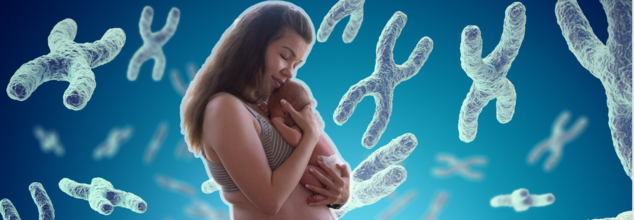- Health Conditions A-Z
- Health & Wellness
- Nutrition
- Fitness
- Health News
- Ayurveda
- Videos
- Medicine A-Z
- Parenting
Mother's DNA Shapes Baby’s Brain And Age- How Exactly Does It Happen?

Image Credit: Health and me
We all have learned how the maternal experiences and struggles during pregnancy profoundly influence the unborn child. From nutritional deficiency to emotional stress, every choice and challenge shapes baby development. These invisible connections between biology and love remind us how the mother's journey is deep-rooted in relation to the lifelong health of her offspring.
Newborn health has been the focus of research in medicine and science for quite some time now, as the early years of life usually lay the groundwork for long-term health. New research has begun to reveal just how maternal factors, such as the effects of the X chromosome and vitamin D levels during pregnancy, shape the health trajectory of a newborn. These findings unravel the intricate interplay between genetics, epigenetics, and maternal contributions in brain health and development, bringing new insights into how we approach neonatal care.
How Does the Maternal DNA Work?
The maternal X chromosome, teeming with genetic material, plays a pivotal role, perhaps impairing memory and cognitive abilities over time. Recent research indicates a significant correlation between the DNA of a mother and her baby's brain health and aging process. Studies on mice indicate that maternal genes may accelerate biological aging in the hippocampus—a brain region crucial for learning.
Moreover, silenced genes on the maternal X chromosome may have keys to cognitive development. When combined with health factors related to the mother, such as the vitamin D level during pregnancy, this complex genetic dance underscores how a mother's DNA profoundly shapes the lifelong health trajectory of her baby. An interesting study has found that the X chromosome inherited from the mother could hasten brain aging in offspring, thus increasing the susceptibility of diseases such as Alzheimer's.
Though women have two X chromosomes and men have one X and one Y, the genetic material of the X chromosome is very important. Mutations or changes in this chromosome can greatly affect brain health.
Researchers have found that in females, one X chromosome is randomly inactivated in each cell, a phenomenon that may explain some of the individual differences in brain health outcomes. Although women typically live longer and have a lower overall dementia rate than their male counterparts, Alzheimer's disease disproportionately affects females, often raising questions about the underlying genetic mechanism.
Dena Dubal and Abdulai-Saiku led research into the impact of maternal X chromosomes on brain health. They found that female mice with an active maternal X chromosome showed accelerated biological aging in the hippocampus, a region of the brain important for learning and memory. These mice also showed worse cognitive abilities as they aged compared to those with contributions from both maternal and paternal X chromosomes.
Interestingly, the cognitive abilities of aged female mice improved when researchers used CRISPR gene-editing technology to activate silenced genes on the maternal X chromosome. This finding underscores the importance of the genetic expression of the maternal X chromosome in influencing brain health.
It thus provokes the mind with such a question, where maternal genetic contribution is actually found shaping brain development and aging in human. Should similar mechanisms prevail, targeted therapies may prevent the decline that typically accompanies the passing of age to improve general health of the brain.
How Even Vitamin D Is A Critical Factor in Neonatal Health?
Another dimension of maternal influence over the health of newborns is vitamin D level in pregnancy. Deficiency of vitamin D has been one of the most common problems, especially among pregnant women in Asia. Several adverse health conditions have also been correlated with vitamin D deficiency.
Vitamin D's influence extends beyond its well-known role in bone health. Emerging evidence highlights its epigenetic effects, such as programming fetal development and shaping immune cell function. One critical epigenetic mechanism is DNA methylation, which predicts biological age and reflects developmental processes.
A Japanese study published in Nutrients looked into the impact of maternal vitamin D on epigenetic gestational age acceleration-a biomarker for neonatal and adult health. The results found that vitamin D deficiency during pregnancy may affect the development of a fetus, placing newborns at risk for infections, obesity, and other health-related issues later in life.
Given the high prevalence of vitamin D deficiency, these findings highlight the importance of intensive prenatal care, including monitoring and supplementation of maternal vitamin D levels. Correction of this deficiency may have a significant role in improving neonatal outcomes and laying the foundation for healthier adulthood.
Also Read: Is Father Equally Responsible For Baby's Health?
Role of X Chromosomes in Baby's Brain Development
X chromosomes have long been recognized as critical to brain health. Previous research has linked mutations in the X chromosome to intellectual disabilities and cognitive impairments. For instance, women with Turner Syndrome, who have only one X chromosome, often experience cognitive challenges.
This genetic influence might also explain differences in cognitive abilities, verbal memory, and susceptibility to brain disorders between sexes. The maternal X chromosome, as highlighted in recent studies, appears to be particularly influential in shaping these outcomes.
The intricate relationship between maternal factors and newborn health underscores the importance of a comprehensive approach to prenatal care. Key takeaways include:
Genetic Contributions
Maternal genes, especially the X chromosome, may therefore play a large role in cognitive health and aging.
Nutritional Interventions
Fixing maternal deficiency in vitamin D may mitigate potential risks associated with developmental and long-term health concerns.
Future Research
Further research on the contribution of mothers to their health, furthered by the development of newer technologies such as CRISPR, promises to bring significant advancements in neonatal and adult healthcare.
Understanding the profound implications of maternal health on newborns changes the focus of neonatal care. From genetic effects to the significance of nutrients, such as vitamin D, research emphasizes the demand for an all-inclusive approach that is more science-based about maternal and neonatal health. As researchers explore the links of maternal factors in long-term wellbeing, healthcare facilities around the globe must evolve towards better support systems, education programs, and intervention strategies for would-be mothers.
This developing field of research reminds us that the journey to a healthy life begins long before birth, in the intricate bond between mother and child.
The maternal X chromosome affects cognition and brain ageing in female mice. Nature (2025)
End Of 'Gentle Parenting'? Why Gen Z Parents Are Turning To 'FAFO'

Credits: iStock
Parenting expert Bethany Braun-Silva in a conversation with ABC News says that 2025 was the banner year for gentle parenting, but the tide is shifting now. However, she notes, "parents are understanding now that emotional awareness and empathy is as important as setting firm boundaries and parental expectations." This is why 2026 is now becoming a year when there is a shift away from gentle parenting. She notes that gentle parenting actually stands for firm boundaries, however, "some people rode that 'gentle' train too seriously".
An article by Mother.ly notes that critics often argue that gentle parenting often blurs the line between kindness and permissiveness. It argues that this leaves parents at the risk of being seen as pushovers. In fact, new research shows that it is the Gen Z parents who are moving away form "gentle parenting".
What Is The New FAFO Parenting Style Gen Z Moms And Dad Are Switching Too?
Another Wall Street Journal piece notes that more and more parents are now embracing FAFO, which is short for F-Around and Find Out. What does it mean? The idea is that parents can ask and warn their children, but if the child breaks the rules, parents cannot stand in the line of repercussions. "Won’t bring your raincoat? Walk home in the downpour. Didn’t feel like having lasagna for dinner? Survive until breakfast. Left your toy on the floor again? Go find it in the trash under the lasagna you didn’t eat," notes the WSJ.
Parenting styles that emphasized minimal discipline have shaped child-rearing over the past few decades. Critics now argue that this approach has contributed to some of Gen Z’s struggles in adulthood. They point to surveys showing young adults grappling with workplace relationships and rising anxiety and depression, questioning whether constant parental intervention and a reluctance to say “no” played a role.
For parents who have spent years trying to balance emotional support without tipping into permissiveness, FAFO can feel refreshingly straightforward.
What Is Wrong With Gentle Parenting?
The argument is that gentle parenting puts a lot of pressure on parents, and promote unrealistic expectations. Emily Edlynn, a licensed clinical psychologist who specializes in pediatric health psychologist writes for Psychology Today, that gentle parenting "adds stress to parenting that we don’t need. Higher stress undoubtedly impacts our relationship with our child in a negative way, more so than having our authentic moments of being human".
She argues that it is okay for parents to show frustration with a child who has asked the same question for the seventeenth time because the child did not like the answer. She says that expressing is better than holding all the frustration in. In fact this shows a natural demonstration of feelings and teaches the child to be expressive too.
Gentle parenting discussions often blur the line between punishment and discipline. Decades of research show that behavioral tools are not inherently punitive and can be an effective part of discipline. Discipline is meant to teach, while punishment is not. It is possible to combine emotional connection with clear consequences.
This One Habit That Parents Hate May Be Good For Children's Mental Health

Credits: iStock
A habit that all parents hate could improve children's mental health. What is this? A new study published in The Journal of Affective Disorders is challenging one of the most common weekend arguments between parents and teenagers. Letting teens sleep in on weekends, something many parents see as laziness or poor discipline, may actually protect their mental health and lower the risk of depression.
The research was conducted by scientists from the University of Oregon and the State University of New York Upstate Medical University. They analyzed data from more than 1,000 young people between the ages of 16 and 24. Participants reported their usual sleep and wake times during the week and on weekends, including how much extra sleep they got by sleeping in on non-school days.
What Did The Study Find?
The findings were striking. Teens and young adults who allowed themselves to catch up on sleep over the weekend were significantly less likely to report symptoms of depression. In fact, those who slept in had a 41 per cent lower risk of depression compared to peers who stuck to the same early wake-up routine even on weekends.
This may sound counterintuitive to parents who believe that waking up early every day builds discipline and mental toughness. But researchers say adolescent biology tells a very different story. During puberty, the body’s internal clock shifts, making teens naturally inclined to fall asleep later at night and wake up later in the morning.
“Instead of being a morning lark, you’re going to become more of a night owl,” Melynda Casement, associate professor at the University of Oregon and co-author of the study, explained in a conversation with ScienceDaily. She added that this shift toward later bedtimes often lasts until around the ages of 18 to 20 before gradually stabilizing.
Why Does This Problem Arise?
The problem is that school schedules and daily responsibilities do not adapt to this biological change. Early school start times, homework, coaching classes, extracurricular activities, social commitments and even part-time jobs mean many teens are forced to wake up before their bodies are ready. Over time, this leads to what experts call “sleep debt”.
Casement points out that teenagers ideally need eight to ten hours of sleep each night, but most fail to get enough during the week. This chronic sleep deprivation has been closely linked to low mood, emotional regulation issues and a higher risk of depression. Weekend sleep, she says, can help offset some of that damage.
“It’s normal for teens to be night owls,” Casement notes. Allowing them to catch up on sleep over the weekend, especially when weekday schedules make adequate rest impossible, may offer meaningful mental health protection.
The study adds to a growing body of evidence supporting this idea. A 2025 meta-analysis of 10 studies found that weekend catch-up sleep was associated with a 20 per cent lower risk of depression. Taken together, the research suggests that sleeping in is not simply teenage rebellion or laziness, but a coping mechanism for an exhausting weekly routine.
At a time when concerns about adolescent mental health are rising globally, those extra hours of weekend sleep may be doing more good than parents realize. Sometimes, letting your teen sleep in might be one battle worth losing.
Parents Are Now Preferring Girls Over Boys; What Led To This Shift?

Credits: iStock
Not too long ago, in 2000, 1.6 million girls were missing from the number given at the natural sex ratio at birth, 26 years later, the number is at 200,000, and it is still falling. What has changed? The Economist reported that more and more parents are now preferring girl child over boys.
Earlier, parents were desperate for a boy, or did not just want a large family. In fact, in China, people would routinely terminate females. The practice of aborting girls is now becoming less common. The natural ratio is about 105 boy babies for every 100 girls. This is also because boys are more likely to die young, which could lead to rough parity at reproductive age. Sex ratio at birth has become more even across Asia. In 2006, China reported the peak of 117.8 boys per 100 girls, which went down to 109.8 in 2025. India too fell from 109.6 in 2010 to 106.8. In South Korea, in 1990, it was 115.7, which has now come back to normal.
Why Is There A Shift In Baby Preference?
There was a sexist tradition that believed that men mattered more. This came from the expectation that daughters will grow up and serve her husband's family. This is why parents preferred baby boys who would look after them in old age. Another idea is of dowry, to marry off a woman, the parents needed to have a stronger financial and economic backing, so the dowry could be paid at the time of her marriage. This is why many families did not want girl child. While these sexist ideas have not completely vanished, there are evidences that they are slowly fading away.
Secondly, this selective abortion has become a weapon against men, as it has led to lifelong bachelorhood. In China, they are known as "bare branches", and they were the ones who resented it intensely. Their anger also had wider social consequences. Large numbers of young, unmarried men are more likely to fuel instability and violence. Studies across several Asian countries have linked distorted sex ratios to higher rates of rape, violent crime in China, stricter policing to control unrest, and even greater risks of civil conflict or war elsewhere.
In India, especially in Haryana, bride buying, a controversial practice was found as a substitute for the lack of girls to marry the sons. These brides were purchased from backward economic background, which often led to exploitation.
As son preference declines, many societies are becoming safer.
At the same time, a subtle shift toward preferring daughters is emerging in some regions. This trend is far less extreme: parents are not eliminating boys, nor does any major country show a surplus of girls. Instead, the preference appears in attitudes and behavior. In Japan, couples wanting just one child tend to favour girls. Globally, parents often want both sexes, but in the US and Scandinavia, couples with sons are more likely to have additional children, suggesting a desire for daughters. Adoption data show families willing to pay more for girls, and where sex selection through IVF is legal, more women are choosing female embryos.
What Makes Parents Prefer Girl Child?
People are preferring girls for all sorts of reasons, which are:
- Some thing they are easier to bring up
- Some cherish what they see as "feminine" traits
- Some think that daughters are better at looking after elderly parents
The emerging preference for daughters also mirrors growing anxiety about how boys are faring. Boys have long been more likely to run into trouble, globally, 93% of the prison population is male. In many countries, they are also falling behind girls in education. In wealthier nations, 54% of young women hold a tertiary degree, compared with 41% of young men. While men remain overrepresented at the very top, in boardrooms, they are also increasingly overrepresented at the bottom, disengaged, isolated, and angry.
These trends have put boys’ struggles on governments’ radar. Because boys tend to mature later, some experts argue for starting them a year later in school. Others suggest more male teachers, especially in primary education, where they are scarce, to provide role models. Stronger vocational training could also steer boys toward careers traditionally avoided by men, such as nursing. Supporting struggling boys does not mean disadvantaging girls, just as giving glasses to someone with poor eyesight does not harm those with perfect vision.
Looking ahead, technology will give parents more choices. Some will be widely accepted, such as editing genes to prevent severe inherited diseases. But expanding access to sex-selection technologies raises harder questions. Couples undergoing fertility treatment can already choose sperm or embryos by sex, and as these methods become cheaper, their use may spread. Even more concerning, early blood tests can reveal an embryo’s sex within weeks, potentially enabling sex-selective abortions through medication, even among parents who conceive naturally.
© 2024 Bennett, Coleman & Company Limited

